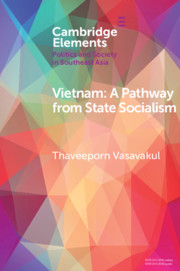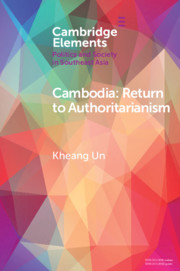1714 results in South-East Asian government, politics and policy
11 - Labour Market Developments in the Jokowi Years’
-
-
- Book:
- The Indonesian Economy in Transition
- Published by:
- ISEAS–Yusof Ishak Institute
- Published online:
- 16 May 2019
- Print publication:
- 06 March 2019, pp 289-317
-
- Chapter
- Export citation

Vietnam
- A Pathway from State Socialism
-
- Published online:
- 04 February 2019
- Print publication:
- 07 February 2019
-
- Element
- Export citation

Cambodia
- Return to Authoritarianism
-
- Published online:
- 01 February 2019
- Print publication:
- 07 February 2019
-
- Element
- Export citation
1 - Introduction: Thai Realities and Possibilities after the 22 May Coup
-
-
- Book:
- After the Coup
- Published by:
- ISEAS–Yusof Ishak Institute
- Published online:
- 23 May 2019
- Print publication:
- 07 January 2019, pp 1-23
-
- Chapter
- Export citation
7 - Thailand's Zigzag Road to Democracy: Continuity and Change in Military Intervention
-
-
- Book:
- After the Coup
- Published by:
- ISEAS–Yusof Ishak Institute
- Published online:
- 23 May 2019
- Print publication:
- 07 January 2019, pp 170-193
-
- Chapter
- Export citation
About the Contributors
-
- Book:
- After the Coup
- Published by:
- ISEAS–Yusof Ishak Institute
- Published online:
- 23 May 2019
- Print publication:
- 07 January 2019, pp vii-viii
-
- Chapter
- Export citation
11 - Thailand's Royal Democracy in Crisis
-
-
- Book:
- After the Coup
- Published by:
- ISEAS–Yusof Ishak Institute
- Published online:
- 23 May 2019
- Print publication:
- 07 January 2019, pp 282-307
-
- Chapter
- Export citation
2 - The Rise of the Thai Upper Middle Class and its Turn against Democracy
-
-
- Book:
- After the Coup
- Published by:
- ISEAS–Yusof Ishak Institute
- Published online:
- 23 May 2019
- Print publication:
- 07 January 2019, pp 24-57
-
- Chapter
- Export citation
5 - The Red Shirts and their Democratic Struggle in Northern Thailand, April 2010 – May 2015
-
-
- Book:
- After the Coup
- Published by:
- ISEAS–Yusof Ishak Institute
- Published online:
- 23 May 2019
- Print publication:
- 07 January 2019, pp 114-139
-
- Chapter
- Export citation
3 - “We the Southerners Come to Protect the Nation and the King”: Southerners’ Political Rise and Regional Nationalism in Thailand
-
-
- Book:
- After the Coup
- Published by:
- ISEAS–Yusof Ishak Institute
- Published online:
- 23 May 2019
- Print publication:
- 07 January 2019, pp 58-89
-
- Chapter
- Export citation
Index
-
- Book:
- After the Coup
- Published by:
- ISEAS–Yusof Ishak Institute
- Published online:
- 23 May 2019
- Print publication:
- 07 January 2019, pp 451-465
-
- Chapter
- Export citation
8 - Murder and Regress: Violence and Political Change in Thailand
-
-
- Book:
- After the Coup
- Published by:
- ISEAS–Yusof Ishak Institute
- Published online:
- 23 May 2019
- Print publication:
- 07 January 2019, pp 194-223
-
- Chapter
- Export citation
9 - Thailand's Politics of Decentralization: Reform and Resistance before and after the May 2014 Coup
-
-
- Book:
- After the Coup
- Published by:
- ISEAS–Yusof Ishak Institute
- Published online:
- 23 May 2019
- Print publication:
- 07 January 2019, pp 224-253
-
- Chapter
- Export citation
Frontmatter
-
- Book:
- After the Coup
- Published by:
- ISEAS–Yusof Ishak Institute
- Published online:
- 23 May 2019
- Print publication:
- 07 January 2019, pp i-iv
-
- Chapter
- Export citation
15 - Conclusion: Thailand in Transition
-
-
- Book:
- After the Coup
- Published by:
- ISEAS–Yusof Ishak Institute
- Published online:
- 23 May 2019
- Print publication:
- 07 January 2019, pp 381-388
-
- Chapter
- Export citation
Contents
-
- Book:
- After the Coup
- Published by:
- ISEAS–Yusof Ishak Institute
- Published online:
- 23 May 2019
- Print publication:
- 07 January 2019, pp v-vi
-
- Chapter
- Export citation
12 - The Foreign Press and its Changing Perceptions of the Thai Monarchy
-
-
- Book:
- After the Coup
- Published by:
- ISEAS–Yusof Ishak Institute
- Published online:
- 23 May 2019
- Print publication:
- 07 January 2019, pp 308-334
-
- Chapter
- Export citation
10 - Change and Continuity in the Politics of the Media after the Coup
-
-
- Book:
- After the Coup
- Published by:
- ISEAS–Yusof Ishak Institute
- Published online:
- 23 May 2019
- Print publication:
- 07 January 2019, pp 254-281
-
- Chapter
- Export citation
6 - The Shifting Battleground: Peace Dialogue in Thailand's Malay-Muslim South
-
-
- Book:
- After the Coup
- Published by:
- ISEAS–Yusof Ishak Institute
- Published online:
- 23 May 2019
- Print publication:
- 07 January 2019, pp 140-169
-
- Chapter
- Export citation
13 - Thai Economic Growth: Retrospect and Prospect
-
-
- Book:
- After the Coup
- Published by:
- ISEAS–Yusof Ishak Institute
- Published online:
- 23 May 2019
- Print publication:
- 07 January 2019, pp 335-356
-
- Chapter
- Export citation

